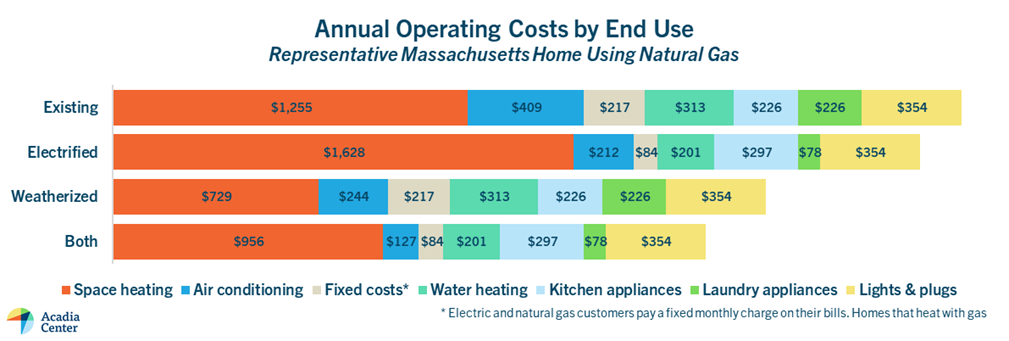PowerHouse and Building Electrification: Fact vs. Fiction
Nearly a third of greenhouse gas emissions in the Northeast come from buildings, and most of these emissions result from burning fossil fuels on-site for space heating, water heating, and cooking. Electrifying these end uses with clean, efficient electric equipment—like air- and ground-source heat pumps—is a necessary part of any realistic state climate policy.
Yet the fossil fuel industry and its allies have invested heavily in sowing doubt about electrification. Acadia Center’s PowerHouse home energy simulator counters this misinformation with a detailed analysis of the real costs and benefits of eliminating fossil fuel use in homes.
Information Gaps
PowerHouse is designed to fill a gap in analysis and information available to the public, enabling Acadia Center and its partners to provide credible data to rebut arguments made by the opponents of electrification. The simulator evaluates residential energy needs using ACCA Manual J algorithms and ten years of hourly weather data for eight locations around the Northeast. This allows for an analysis of operating costs, peak demand impacts, demand management potential, and net emissions that is both detailed and state-specific, rather than relying on regional or national averages.
A key capability of the PowerHouse tool is to quantify the compounding benefits of delivering whole-home electrification and weatherization as a package for a variety of residential building types. Weatherization measures like insulation and air sealing can dramatically reduce both the up-front and operating costs of electrification for most homes. PowerHouse puts a dollar value on these savings.


PowerHouse counters common misconceptions about electrification, including:
- MYTH: Heat pumps cost too much! The simulator demonstrates that whole-home electrification and weatherization leads to an overall cost reduction, which can be even more substantial in the drafty, old homes where marginalized communities often live.
- MYTH: Electrification won’t actually reduce emissions! As the model clearly demonstrates, whole-home electrification can immediately reduce emissions by more than half—an impact that grows each year as the grid adds more renewable resources.
- MYTH: Electrification will blow up the grid! Peak demand impacts are an important factor, but concern about the grid is overblown due to unreasonably pessimistic expectations about heat pump performance.
- MYTH: Heat pumps don’t work in the cold! Currently available cold-climate heat pump models can meet a home’s full heating needs in temperatures well below zero. Thousands are installed in the Northeast every year.
Equity and Justice
Low- and moderate-income households, communities of color, and English-isolated households in the Northeast are more likely to live in older, less efficient housing units. They are also more likely to be renters with very little control over their energy use decisions. Extending the benefits of energy efficiency and electrification to these households will require a concerted and meaningful commitment of resources—something that can be understood perfectly well without a home energy model.
However, PowerHouse can help to make the case for investing in marginalized communities by demonstrating the energy burden that these households suffer. A drafty, old house or apartment can cost six times as much to heat in the winter than a new unit of the same size built to the current building code. Providing clear, accurate numbers about energy burden for state decision-makers and other stakeholders can help bring the issue home for people who might never have dealt with energy bills like this themselves.
Grid impacts
Electric grid impacts are a common area of concern when it comes to heat pumps. Understanding the relationship between equipment performance, weather, and the peaks and troughs of electric demand is critically important to the overall project of building electrification.
PowerHouse closely parses this relationship, accounting for building shell characteristics, heat pump capacity, and input power for each hour of the year—granularity that is not possible with existing home energy modeling software. In this way, it can help to develop strategies for achieving building electrification at scale, for both new construction and retrofits.
Acadia Center’s PowerHouse home energy simulator meets fossil fuel industry misinformation with clear, fact-based analysis that proves the benefits of building electrification. By arming Acadia Center and its partners with this fine-grained analytical capability, the models will give advocates an advantage over the army of consultants working with oil and gas companies to irresponsibly prolong the use of fossil fuels.




















Follow us